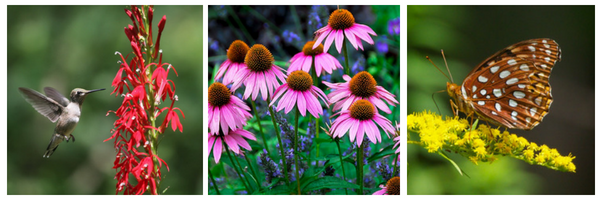
Where
Five home gardens in the Tennessee ValleyTN
ADVANCE ONLINE REGISTRATION IS CLOSED.
Tickets will be available at all five of the garden tour sites on Saturday, September 8th.
For garden locations, download the brochure at www.tennesseevalley.wildones.org
 |
Bringing Nature Home Garden Tour
The Bringing Nature Home Garden Tour, sponsored by the Tennessee Valley Chapter of Wild Ones, will take place on Saturday, September 8, 2018, from 10 a.m. to 6 p.m. The tour, featuring four stunning private gardens and the Tennessee Aquarium Conservation Institute on the Baylor Campus, will shine a spotlight on native plant gardens that support a variety of wildlife.
The garden tour proves that native gardens are beautiful and can be designed for any budget and that each of us plays a critical role in supporting biodiversity. Journey some of the area's most beautiful native plant gardens. Chapter volunteers at each garden will help visitors learn the "whys" and "how tos" of native plant gardening.
Most people know that pollinators such as bumble bees, Monarch butterflies, and honey bees are in trouble and that one out of three bites we eat are a result of our animal pollinators. Research has shown that native plants draw 43 percent more pollinators than the typical exotic, non-native plants used in most gardens and landscapes. The featured gardens provide "host" plants for butterflies. These special plants provide food for caterpillars and are essential to the butterfly lifecycle. Pretty flowers for "nectaring" are nice, but without the host plants there will be no butterflies in your garden! This garden tour will show you how to incorporate native plants in your landscape in attractive and functional ways.
Featured Gardens:
An Oasis for Birds, Pollinators and People
Come and learn how you can transform a Bermuda grass lawn and invasive-riddled landscape into a Certified Wildlife Habitat using native trees, shrubs, vines, and perennials specifically chosen to support nature. Sit by the pond or streamside and watch the fish swim by while butterflies, dragonflies, and bees sip nectar from the native pickerel weed. Wander through the meadow to a gazebo. This Signal Mountain garden is buzzing with life! Cheri Hubbard’s Garden, 842 Fairmount Ave, Signal Mountain.
An Inspired Sanctuary
Walk in the shade and listen to the rustling of leaves among tall oak, hickory and maple trees. Take some time for a meditative walk on the stone labyrinth lined with wild ginger and ferns. Rest in a hammock or sit for a while on a garden bench with a class of lemonade. Relax among the buckeyes, laurels, hydrangeas, rhododendrons, and othe native plants tha make a home for birds, turtles and pollinators galore. This signal Mountain garden, complete with extensive plant labeling, will give you plenty of ideas to create your own living landscape. Nora and Bob Bernhardt's Garden, 307 Clegg Street, Signal Mountain.
Sustainability and Conservation in Action
Along the banks of the Tennessee River, the Tennessee Aquarium Conservation Institute’s native plant landscape showcases how sustainable design can protect ecosystem health while creating connections between people and the natural environment. The Conservation Institute’s landscape serves as a living classroom, where visitors learn about the importance of cleansing rainwater as it travels from the building’s roof, through a series of bioretention and bioswale areas, through a naturally occurring wetland, and ultimately into the Tennessee River. Tennessee Aquarium Conservation Institute, 172 Baylor School Road, Chattanooga.
A Former Farmstead Transformed
Have you ever wondered what pink muhly grass looks like, or what exactly is a pawpaw? Come and learn about over 600 species of native trees, shrubs, grasses and perennials planted on this three-plus acre parcel in Red Bank that was previously a farm. There is also a special pollinator demonstration garden for would-be small area gardeners needing guidance. Bill Molls’ Garden (David Hartman Homeplace), 4918 Marlow Drive, Red Bank.
Looking Out for Pollinators
Perched on the brow of Lookout Mountain, this home is framed by a hedge of hydrangeas fronted with blazing stars, asters and black-eyed Susans. The beds around the formal lawn are rich with native perennials, shrubs and trees. The homeowner acquired an adjacent lot and planted a meadow featuring five different milkweed species (Monarch butterfly host plants) and native grasses that provide food and shelter to butterflies, bees and other pollinators. Bob and Deb Hulse’s Garden, 910 East Brow Road, Lookout Mountain, Tenn.
TICKET INFORMATION
The featured gardens may be visited in any order. All tickets are $10. Children under age 12 accompanied by an adult are free.
Proceeds from the Bringing Nature Home Garden Tour will benefit the Chattanooga Area Pollinator Partnership’s Seeds for Education. This nationally recognized program awards grants of up to $500 to area public and private K-12 schools for native plants and seeds for pollinator gardens.
The garden tour is sponsored in part by WMWA Landscape Architects, Dream Gardens, Overhill Gardens, Tennessee Naturescapes, Chattanooga Area Pollinator Partnership, and Reflection Riding Arboretum and Nature Center.
If you register and pay online, we recommend using a browser other than Safari.
Some users have reported difficulty making a payment using Safari.
If you do not pay online, you will need to mail your check to Wild Ones-Tennessee
Valley Chapter, 4918 Marlow Drive, Red Bank, TN 37415. Please put the date
of the program in the memo line as well as the last name of the person you are
registering. You will not be registered until your payment is received.
